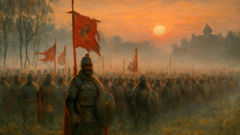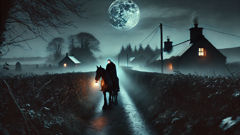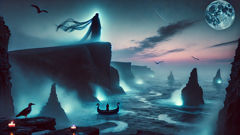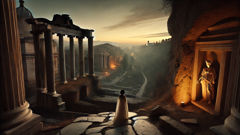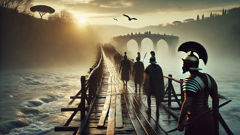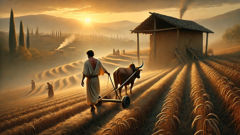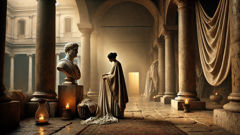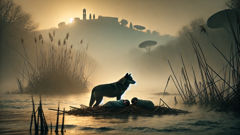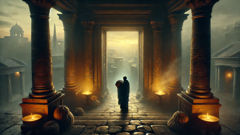Introduction
In the waning days of summer, when the steppe grasses swayed like a living sea and mist curled over the rivers of southern Rus', a storm gathered in the hearts of men. Word spread quietly from monastery to market: the Mongol yoke, which had weighed upon the Russian principalities for over a century, threatened to tighten yet again. The air was thick with uncertainty, but among the scattered towns and ancient forests, a new spirit was rising—a promise whispered from prince to peasant, one that would soon be written in blood and memory. This is the world of the Zadonshchina, the legend of Kulikovo Field. It is a landscape haunted by shadows of fear and divided loyalties, where the rivers run deep and the birch forests keep ancient secrets. Here, noble princes ride beneath banners stitched by trembling hands, bound by fragile alliances, yet determined to reclaim a measure of dignity for their battered land.
The year is 1380. The Grand Prince Dmitry Ivanovich of Moscow—soon to be known as Donskoy—has resolved to face Mamai, the formidable commander of the Golden Horde. For decades, Russian lands have paid tribute to these Mongol overlords. Now, emboldened by prophecy and unity, Dmitry gathers the princes and boyars, summoning men from Suzdal, Ryazan, Tver, and beyond. They meet at Kolomna, where the Oka River glitters beneath the wide, watchful sky.
Yet unity is brittle. Old feuds flare at council tables. Some princes grumble in secret, their eyes fixed on personal gain. Still, hope blooms—a rare flower after generations of submission. Monks pray in candle-lit cathedrals, and blacksmiths hammer swords late into the night. As the army marches south, banners streaming and bells ringing, the air itself seems to tremble with anticipation and dread. For at Kulikovo, on a plain bordered by the Don and the Nepryadva, destinies will collide. It is not just a battle of swords and arrows, but of identity—of whether Rus' will stand divided or become something more.
This is a tale of valor and betrayal, of haunting omens and immortal glory. The Zadonshchina survives in fragments and echoes, a song carried across centuries. But on the eve of battle, no one knows whose names will live and whose will be lost to the whispering grass. Step now into the mist with Dmitry and his brothers. Hear the hoofbeats, smell the smoke, and witness the dawn that changed a nation forever.
The Gathering Storm: Dmitry’s Council and the March to Kulikovo
The bells of Moscow tolled with a somber resonance that reached far beyond the Kremlin’s red brick walls, echoing across the wooden lanes and cobbled squares of the ancient city. Grand Prince Dmitry Ivanovich stood at his window, gazing over rooftops dusted with the pale haze of dawn. Beneath him, the courtyards filled with a restless tide of soldiers: grizzled boyars in wolf-fur cloaks, barefoot peasants clutching hunting spears, merchants in patched tunics, their faces tense with purpose. A faint tang of steel and smoke hung in the air, mingling with the scent of damp earth.
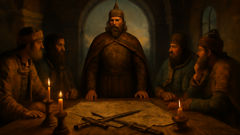
Dmitry’s council chamber was a tumult of color and noise. The princes of Suzdal, Rostov, Tver, and Ryazan crowded around a battered oak table, their voices sharp with pride and anxiety. At the far end, Dmitry’s cousin Vladimir the Bold—proud, impetuous—leaned close, his eyes flashing with excitement. In quiet corners, old grievances simmered. Some remembered betrayals decades past; others measured the future by the weight of their private ambitions. Yet, as Dmitry rose to speak, silence descended like a cloak.
“My brothers,” he said, his voice steady but heavy with what was to come, “for too long we have bent our necks beneath the Tatar yoke. Our sons grow up hearing tales of ancient glory, yet they see only fear. The Golden Horde presses ever closer. Will we meet them on our knees or with swords drawn?” He paused, searching the eyes of each prince. “This is our hour. If we do not stand together now, we may never stand again.”
The words kindled something in the room—a spark of unity. A pact was struck, sealed not with parchment but with the promise of shared fate. Men clasped forearms, their oaths uttered beneath the icon of St. George.
Soon after, the armies gathered at Kolomna, where the Oka and Moskva rivers met in a wide, sunlit plain. The assembly was a spectacle: ranks of spearmen, cavalry in scale armor, archers with curved bows slung across their backs. Monks walked among them, sprinkling holy water, whispering blessings. The womenfolk watched from behind the river willows, some weeping, others silent with pride.
As the army marched south, the land itself seemed to change. The forests grew denser, haunted by the cries of unseen birds. At night, campfires flickered between tents, and tales of saints and monsters circled in the darkness. The younger warriors whispered of omens: a blood-red moon, a stag leaping across the road, the strange hush before morning. But Dmitry pressed on, carrying the weight of his people’s hopes—and their fears.
On the eve of crossing the Don, Dmitry called his closest advisors to a final council. “If we cross, we cannot turn back,” warned an old boyar from Ryazan. “The river will be our shield, or our grave.” Dmitry nodded. In the flickering light, his face was drawn but resolute. “Let tomorrow decide,” he answered. “We fight for more than land. We fight for the soul of Rus’.”
Thus the stage was set for the coming storm. The Russian host, united for one brief moment, moved toward destiny—toward Kulikovo.
Shadows Before Dawn: The Night at Kulikovo
The Russian host reached Kulikovo Field under a sky bruised with sunset, the grass wet beneath their feet and the air heavy with silence. On one side, the Don River coiled like a serpent, its banks thick with willows and reeds; on the other, a low ridge shadowed by forests promised both cover and uncertainty. Dmitry’s army halted in orderly lines, thousands strong, their armor dulled by dust and sweat. Yet for all their number, fear fluttered at the edges of every heart.
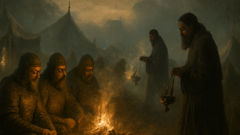
That night, fires studded the field in a constellation of orange and gold. Warriors gathered in tight circles, sharing black bread and salted fish, their voices low as they whispered prayers and farewells. Some sharpened swords, others fingered wooden crosses, remembering home and loved ones left behind. The priests walked the lines with censers, filling the night with the smell of incense and murmured psalms.
In the center of camp stood a tent of simple canvas where Dmitry knelt beside his shield, its face painted with the image of the Virgin. With him were his cousin Vladimir the Bold and a handful of trusted captains—men who would lead the charge at dawn. Dmitry’s face was pale, but his eyes never wavered. “Tomorrow we meet Mamai’s host,” he said. “They are many. Some say twice our number. Yet faith and courage will carry us where numbers cannot.”
Vladimir placed a hand on Dmitry’s shoulder. “You are the heart of Rus’, brother. Lead us, and we will follow.”
Elsewhere in camp, tension crackled. Rumors spread that some princes—envying Moscow’s growing power—might hold back in the hour of need. One such was Oleg of Ryazan, whose banners fluttered on the far edge of the encampment, his men keeping their distance. Dmitry’s spies reported strange meetings in the shadows: whispered bargains, promises made in secret. The night pressed close.
Just before dawn, a heavy fog rolled in from the river, muffling every sound. In that pale half-light, legends say Dmitry exchanged armor with a humble boyar named Mikhail Brenok, hoping to confound enemy assassins. As he waited in disguise among the rank and file, he heard their anxious prayers, saw the tremor in their hands, and understood what he risked—what all of them risked—for a future no one could guarantee.
A sudden cry split the mist: “To arms! To arms!” The Mongol advance guard had been sighted on the horizon, their banners black against the whitening sky. Dmitry rose, pulled his helm low, and strode forward. Around him, the army formed up into ranks—infantry braced with pikes, cavalry mounted and silent, archers nocking arrows by the dozen. The hush before battle was absolute. Not even the birds dared sing.
The Clash of Hosts: Battle on Kulikovo Field
Dawn came slow and gray, painting Kulikovo Field in mournful hues. The grass, soaked in dew, glistened beneath thousands of feet as Russian and Mongol armies faced one another across the plain. Mamai’s host stretched wide and deep, banners like storm clouds against the horizon. Russian drums beat low—steady, implacable—while trumpets sounded the call to arms.
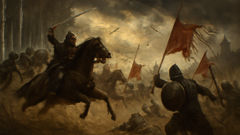
The first to enter battle were the champions: Alexander Peresvet, a monk-warrior from the Trinity Monastery, and the Tatar champion Chelubey. With prayer and steely calm, Peresvet rode out on his white horse, his black cowl fluttering behind him. The duel was swift and brutal. Both men fell in a tangle of blood and banners—the sign for general engagement.
The clash erupted all at once. Arrows darkened the sky in deadly arcs, thudding into shields and armor. The Russian center braced under the first Mongol charge; cavalry thundered in, spears lowered, trampling grass and men alike. Dmitry fought at the heart of the battle, his disguise forgotten as he rallied those who wavered, striking down foes with his broad sword. Around him, chaos reigned: shouts, screams, the clangor of steel on steel.
On the Russian left, Vladimir the Bold’s cavalry smashed into the Mongol flank, splitting their formation. The center wavered. Yet everywhere, death pressed close—arrows finding gaps in armor, horses stumbling in mud and bodies. For hours, the two hosts surged back and forth across the field, neither yielding, the sky thick with dust and cries.
At a crucial moment, Mamai unleashed his reserve—elite cavalry that swept around the Russian right, threatening to break their line. Panic fluttered among the ranks. Then, from the woods at the river’s edge, came a thunder of hooves: the ambush regiment led by Prince Vladimir Serpukhovsky. With fresh banners and gleaming swords, they crashed into Mamai’s flank, sowing confusion and terror among his troops.
The Mongol line broke. Dmitry’s men pressed forward with renewed fury, shouting prayers and ancient war cries. Mamai’s banners fell one by one; his army dissolved into a rout. The field was a tangle of bodies and broken arms, the air thick with smoke and the smell of blood. Yet by noon, the battle was won. The Russians stood battered but victorious, their unity forged in agony and triumph.
Conclusion
In the silence after battle, as smoke drifted across the blood-soaked field and crows gathered on distant trees, Dmitry Donskoy knelt in prayer beside a shattered banner. Around him, survivors moved among the fallen—binding wounds, offering water, whispering thanks for lives spared. The cost had been terrible: thousands lay still on the grass, their faces turned toward a sky now bright with late afternoon sun. Yet in this place of pain and memory, something had changed forever.
News of victory at Kulikovo spread swiftly, borne on the lips of messengers and in the songs of wandering minstrels. It was not an end to Mongol power—the Horde would return—but it marked the first time that divided Russian princes had united to confront their overlords and prevailed. The battle became legend, a touchstone for courage and unity in dark times. Dmitry Donskoy returned to Moscow not as a mere prince but as a symbol of hope. For years afterward, mothers would tell their sons of the mist on Kulikovo, of how faith and resolve turned fear into freedom. And though time would scatter the survivors and grass would reclaim the field, the story endured: in every church bell that tolled, every sword raised in defense of home, every whisper beneath ancient birch trees. The Zadonshchina lived on—a memory carved into the heart of a nation.

